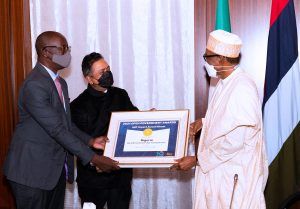Nigeria Joins Seven Countries in Leading The Fight to Stop the Anonymous Flow of Illicit Funds
President Welcomes Open Government Partnership to Review Current Progress on Major Anti-Corruption Initiative.
Nigeria was recognized today by the Open Government Partnership for its pioneering work to fight corruption through its new Beneficial Ownership Registry which will help to halt the flow of illicit funds in the extractives industry. The registry was passed into law in 2020 and is expected to stop the illegal flow of US$15 billion and introduce new levels of fairness to the overall procurement process.
Nigeria officially joined the Beneficial Ownership Leadership Group following President Mahammadu Buhari’s approval earlier this week. The Leadership Group was initiated by the Government of the United Kingdom and is convened by OGP and Open Ownership as a space for reformers to exchange experiences to advance the effectiveness of beneficial ownership registries and end anonymous companies worldwide. Nigeria is the eighth country to officially join the group, which includes Armenia, Mexico, Kenya, Norway, Latvia, the Slovak Republic, and the United Kingdom.
“The OGP process has helped us to develop capacity to deliver governance by including actors in and outside of governments” ,said President Mahammadu Buhari in a meeting welcoming OGP to the country. “Let me take this opportunity to reaffirm this government’s commitment to transparency and combatting corruption.”
Beneficial ownership registries help to track shell companies and other vehicles which are often used to hide profits, terrorist financing, or illegally obtained money. The World Bank estimates that 70 percent of the biggest corruption cases between 1980 and 2010 involved anonymous shell companies.
An OGP delegation led by CEO Sanjay Pradhan visited the country from July 25 to 29 and met with potential users of the portal and received updates on progress of its implementation. The beneficial ownership register is now being developed and implemented by the Registrar General’s office, the Ministry of Finance, in collaboration with civil society and international organizations.
In 2021, Nigeria received the 2021 OGP Impact Award at the OGP Global Summit for this initiative. The registry is expected to be publicly available in the coming months with support from the World Bank’s OGP Multi-Donor Trust Fund.
“Nigeria’s beneficial ownership register is a vital platform that can end anonymous companies hiding illicit and stolen wealth. It can be a potent instrument in the fight against corruption. This has come about through the collaborative efforts of government officials, civil society, the private sector and parliament.” said Pradhan. “We look forward to the effective implementation, monitoring, and evaluation of the registry to ensure reliability and quality of data through periodic verification, and ease in using the platform by stakeholders such as journalists and civil society. Credible implementation can deliver a major, positive impact for the country.”
OGP’s Civil Society Co-Chair, Aidan Eyakuze, commended Nigeria’s civil society for the leading role they have played in designing and implementing impactful reforms. “As Nigeria faces an important transition with the elections in early 2023, it is vital that civil society organizations continue to shape, with a new administration, a government that listens to Nigerians and is truly responsive to their priorities.”
Since Nigeria joined OGP in 2016, an increasing number of local governments have joined the movement. OGP met with the heads and reformers of Kaduna State, the city of Abuja, and Plateau State to exchange experiences and ideas to explore ways to build more impactful reforms. These three local governments are advancing initiatives to enhance citizen participation in open government processes.
Nigeria joined the Partnership in 2016 and is currently implementing 16 commitments from their latest action plan. This action plan features commitments related to fiscal transparency, anti-corruption, extractive transparency, inclusiveness, and public service delivery. Government and civil society partners are now working together on a new action plan that builds on previous efforts to combat corruption and enhance participation.
**
About OGP:
In 2011, government leaders and civil society advocates came together to create a unique partnership—one that combines these powerful forces to promote accountable, responsive and inclusive governance.
Seventy-seven countries and a growing number of local governments—representing more than two billion people—along with thousands of civil society organizations are members of the Open Government Partnership (OGP).
For questions or to set up interviews please contact [email protected]


Leave a Reply